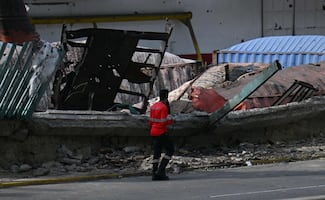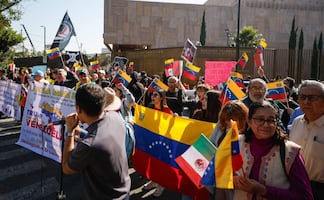Más Información

Captura de Maduro: Así es el USS Iwo Jima (LHD-7), el buque de asalto anfibio que traslada al líder venezolano a EU

EU captura a Nicolás Maduro: Así fue “Absolute Resolve”, la operación para detener al líder venezolano

Países de AL han buscado a México tras ataque de EU a Venezuela, dice Sheinbaum; hace un llamado a la unidad
Spain commemorated the 400th anniversary of the death of its best-known writer, Miguel de Cervantes Saavedra on Saturday.
Events took place throughout the country celebrating the author of "Don Quixote," one of the most influential books in world literature and a work generally regarded as the precursor of the modern novel.
In Alcala de Henares, Cervantes Saavedra's birthplace, King Felipe VI honored Mexican author Fernando del Paso with the Cervantes Prize and Spain's Culture Minister Iñigo Méndez highlighted his "contribution to the development of the novel, combining tradition and modernity, as Cervantes did."
The Cervantes award is handed out each year on April 23. It coincides with UNESCO's World Book Day, which promotes literature and commemorates Cervantes and English playwright William Shakespeare, who died on that date in 1616.
Cervantes Saavedra actually died on April 22, 1616, but Spain commemorates his death on the date he was buried.
Some artists and academics have been critical of Spain's central government for not allocating funds to organize events on a scale similar to those celebrating Shakespeare's life in Britain.
Yet many still found imaginative ways to honor Cervantes Saavedra. Computer expert Diego Buendía designed a program that uploaded the entire text of "Don Quixote" onto Twitter in blocks of 140 characters at a time over the last 17 months. And a popular TV cookery show asked competitors to produce menus linked to the region of La Mancha where "Don Quixote" is set.
A fusion of fantasy and reality, the book narrates the journeys and adventures by its hero and his mule-straddling squire, Sancho Panza.
Alonso Quijano is an unremarkable gentleman who, after immersing himself in countless books about adventurous knights, decides to become one himself. Taking the name Don Quixote de La Mancha, he mounts his nag Rocinante and ventures out from a nameless village in the heart of Spain to right the wrongs of the world and defend the oppressed.
He is clearly mad and mistakes inns for enchanted castles, peasant girls for stunning princesses and confuses windmills with malevolent giants. Sancho knows his master's judgment is unsound, but he sticks by him.
The book has been a best-seller in many languages since it was first published in December 1604. Cervantes Saavedra's descriptive ability convey many elements of Spain that readers can still recognize, including some regional recipes that have come down the centuries almost unchanged.
Modern research has revealed details about Cervantes that have increased interest in him and his work.
A man of no formal schooling, he was 58 when "Don Quixote" was published.
His life was nomadic and full of hardship. He took part in the brutal naval battle of Lepanto that left him with a shattered left arm. Then he spent five years as a hostage in Algeria from where the Barefoot Trinitarians nuns in Madrid rescued him by paying his ransom.
An archeological excavation in 2014 found what experts concluded were Cervantes' bones buried in their convent.
Noticias según tus intereses
[Publicidad]
[Publicidad]











